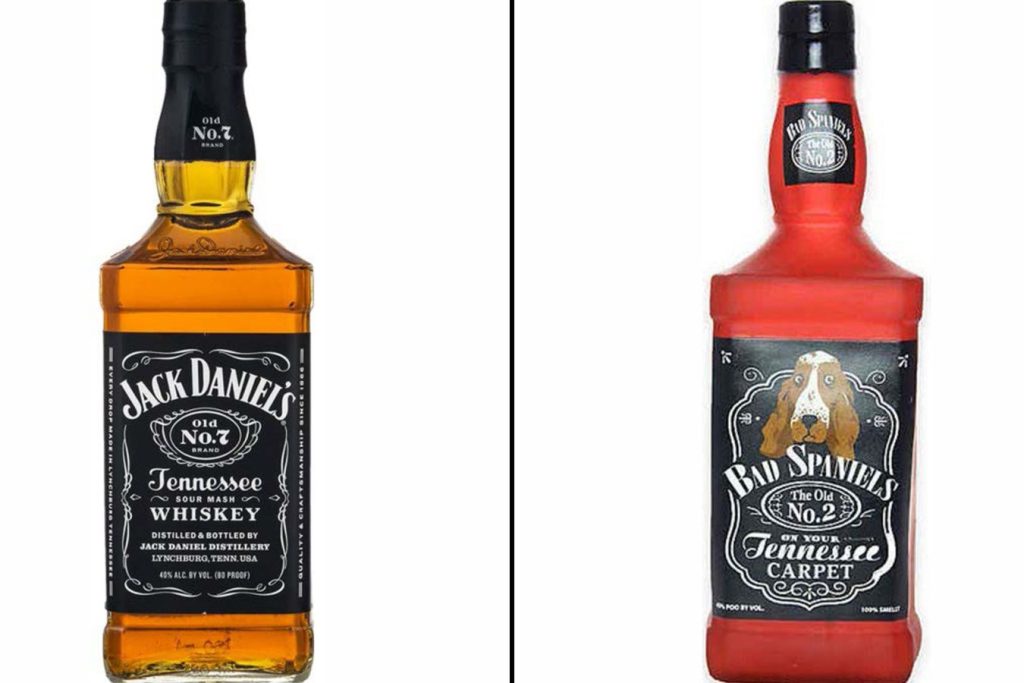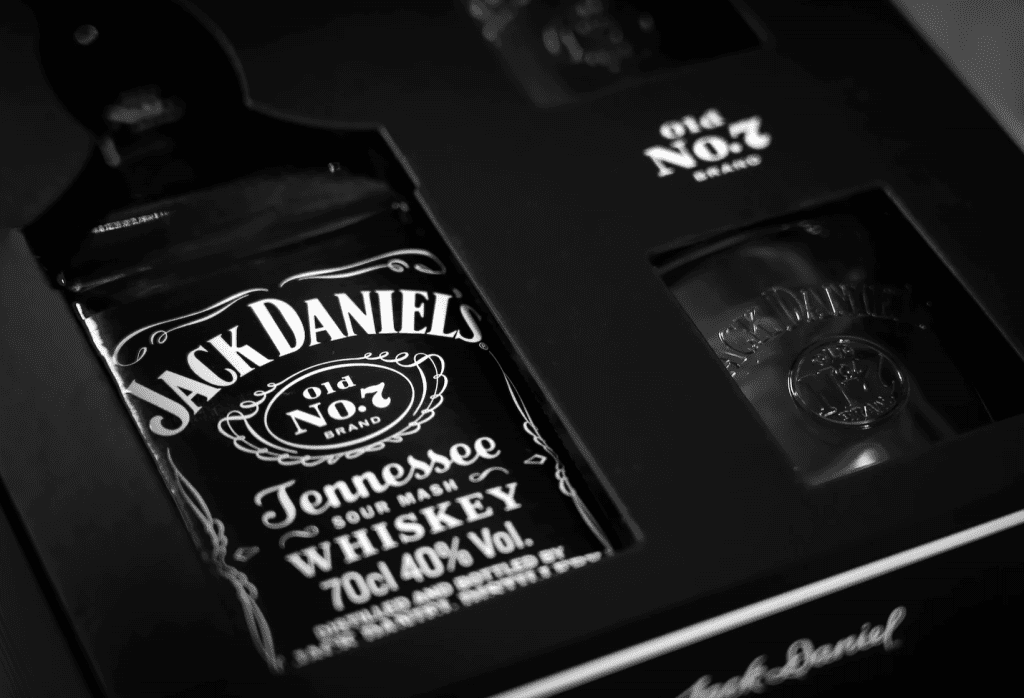The Bad Spaniels case went before the U.S. Supreme Court on Wednesday, after the nation’s highest court agreed in November to take on the case, in which Jack Daniel’s has accused VIP Products of trademark infringement in connection with the design of a dog toy that resembles a bottle of its Old No. 7 Black Label Tennessee Whiskey. The parties’ day in court comes on the heels of the U.S. District Court for the Ninth Circuit holding in March 2020 that the squeaky dog toy is an expressive work entitled to First Amendment protection. The Supreme Court previously refused to take on the case despite Jack Daniel’s argument that lower courts have taken different approaches to trademark infringement claims involving the use of famous marks on commercial products in a “humorous” capacity, and more specifically, the extent to which the Rogers test can be stretched.
By way of background: On the heels of the U.S. District Court for the District of Arizona finding for Jack Daniel’s on its trademark infringement and dilution claims and entering a permanent injunction in its favor, VIP Products appealed. In its decision, the Ninth Circuit sided with VIP Product, holding that the Bad Spaniels dog toy was an “expressive work” that conveys a “humorous message,” and thus, is entitled to protection under the First Amendment. In siding with VIP Products, the court lifted an injunction that barred it from making and selling the toys. While the Ninth Circuit did not set “a clear bar,” Frankfurt Kurnit Klein & Selz’s Vish Mohan wrote after the fact, it, nonetheless, suggested a “low” bar for when a work can be considered an artistic expression.

In its bid for Supreme Court review, counsel for Jack Daniel’s argued that while “everyone likes a good joke,” VIP Products’ Bad Spaniels toy amounts to a “profit-motivated ‘joke’ [that] confuses consumers by taking advantage of Jack Daniel’s hard-earned goodwill.” Far from just being a joke, the whiskey-maker has claimed that the Ninth Circuit’s decision provides “near-blanket protection” for infringers. It doubled-down on this argument in a recent reply brief, asserting that the court’s decision “invites humorists to infringe the marks of alcohol beverages and other famous brands under the umbrella of the First Amendment.”
The short of it: Jack Daniel’s is looking to get the court to limit the application of the Rogers test, which was crafted by the Second Circuit in its 1989 decision in Rogers v. Grimaldi to “shield authors of expressive works from being unduly limited in their expression due to trademark rights.” In accordance with the test, the Lanham Act should not be applied “unless the use of the mark has no artistic relevance to the underlying work whatsoever, or if it has some artistic relevance, unless it explicitly misleads as to the source or the content of the work.”
In its defense, VIP Products has asserted that “freedom of speech begins with freedom to mock,” arguing that it has engaged in parodic (and non-commercial) use of Jack Daniel’s trademarks by way of the dog toys. VIP maintains that it “merely mimicked enough of the iconic bottle so that people would get the joke,” and be confused as to the nature/source of its toy. As such, it claims that the Rogers test should trump a traditional likelihood of confusion analysis.
Now the SCOTUS justices are tasked with considering two key questions: (1) Whether humorous use of another’s trademark as one’s own on a commercial product is subject to the Lanham Act’s traditional likelihood-of-confusion analysis, or instead receives heightened First Amendment protection from trademark-infringement claims, and (2) Whether humorous use of another’s mark as one’s own on a commercial product is “noncommercial” under 15 U.S.C. § 1125(c)(3)(C), thus, barring as a matter of law a claim of dilution by tarnishment under the Trademark Dilution Revision Act.
Reflecting on the Supreme Court’s decision to take on the case back in November, which should result in an outcome before summer 2023, University of Pennsylvania Law School professor Jennifer Rothman stated on Twitter, “This is a big grant with significant implications for first amendment and commercial speech doctrine, trademark law and the Rogers test, and perhaps less recognized for public accommodations laws, as well.” The potential reach of the Court’s opinion is heightened by the fact that the Rogers test is at the heart of a number of other pending cases, including the trademark suit that Hermès has waged over MetaBirkins NTFTs and Vans’ case over MSCHF’s Wavy Baby sneakers.
Among some of the notable takeaways from the almost-two-hour arguments before the Supreme Court on Wednesday …
– Setting the stage, counsel for Jack Daniel’s Lisa Blatt stated, “This case involves a dog toy that copies Jack Daniel’s trademark and trade dress and associates its whiskey with dog poop.” She also stated that “a property right by definition in the intellectual property area is one that restricts speech. You have a limited monopoly on a right to use a name that’s associated with your good or service.”
– Also from Blatt: “The Lanham Act has no exceptions for expressive works. It bars using marks for any goods that would likely cause confusion as to origin, sponsorship or approval. Artistic relevance has nothing to do with confusion.”
– VIP Products’ lawyer Bennet Cooper argued, “In our popular culture, iconic brands are another kind of celebrity. People are constitutionally entitled to talk about celebrities and, yes, even make fun of them.”
– Justice Samuel Alito – who mentioned that he “had a dog” and “know[s] something about dogs” – stated that he is “concerned about the First Amendment implications of [Jack Daniel’s] position. Could any reasonable person think that Jack Daniel’s had approved this use of the mark?” To this, Blatt said, “Absolutely.” She also asserted that Jack Daniel’s makes dog products and sells licensed merch, including like hats and barstool, in the same markets that VIP sells its dog toys. (He disagreed, saying, “A reasonable person would not think that Jack Daniel’s had approved this.)
– Also from Alito: “Some of the hypotheticals and actual cases that are highlighted in the briefing in this case do seem to me to present serious First Amendment issues.” Speaking specifically to Matthew Guarnieri, who argued on behalf of the federal government, he said, “And you seem not to be very concerned about the free-speech implications of the position that you’re taking.”
– On the Lanham Act, Alito stated that “the question isn’t whether it’s constitutional. The question is whether it should be interpreted—and this is where Rogers may come from—in a way that does not bring it into conflict with the First Amendment.” (To this, Blatt stated, “Trademarks have been around since the 1500s. They predated the First Amendment. The Lanham Act clearly is constitutional.”)
– Guarnieri argued that VIP Products should “not get a First Amendment pass to make commercial products that are likely to confuse consumers about the source of your goods or about the senior mark holder’s sponsorship or approval.” He also argued that the Rogers case “was incorrectly decided and is inconsistent with the Lanham Act,” with the Ninth Circuit “dramatically expand[ing]” the scope. (He also noted that the Fourth, Fifth, and Seventh Circuits never adopted the Rogers test, and that “the parodic nature of [a specific] use can be taken into account under the existing likelihood of confusion standard, the statutory standard.”)
– Seemingly unpersuaded from a parody POV, Just Kagan stated, “This is a standard commercial product. This is not a political T-shirt. It’s not a film. It’s not an artistic photograph. It’s nothing of those things … A dog toy, I’m just going to say, is a utilitarian good.” She also added, “You’re using it as a source identifier. It seems like just not a First Amendment-Rogers kind of case.” (She also said, “Maybe I just don’t have a sense of humor, what is the parody?”)
– The parody per, Cooper, is to make fun of companies/marks that take themselves seriously. Kagan listed other companies/marks that VIP used for its toys: “Doggie Walker, Dos Perros, Smella Arpaw, Canine Cola, Mountain Drool” (Johnnie Walker (Doggie Walker), Dos Equis (Dos Perros), Stella Artois (Smella Arpaw), Coca-Cola (Canine Cola) and Mountain Dew (Mountain Drool), ad asked, “Are all of these companies taking themselves too seriously? “Soft drinks and liquor companies take themselves too seriously as a class?” Cooper’s response: Yes.
– From Ketanji Brown Jackson: “If [you] put it on a shelf, right, then you’re not using it in commerce. You’re not shopping it around and potentially confusing people into thinking that Jack Daniel’s is selling this. That’s the whole heartland of the trademark.” Beyond that, she said, “Even though the standard ordinarily for trademark violations in what Congress cared about is people putting things into the marketplace that confuse consumers into believing that it’s from the mark holder or sponsored by the mark holder, if it’s an expressive thing, then we don’t really have to do that. We then just scream First Amendment, and we get out of Lanham Act liability, and I don’t see that in the statute.”
The case is VIP Products LLC v. Jack Daniel’s Properties, Inc., 2:14-cv-02057 (D. Arizona).











